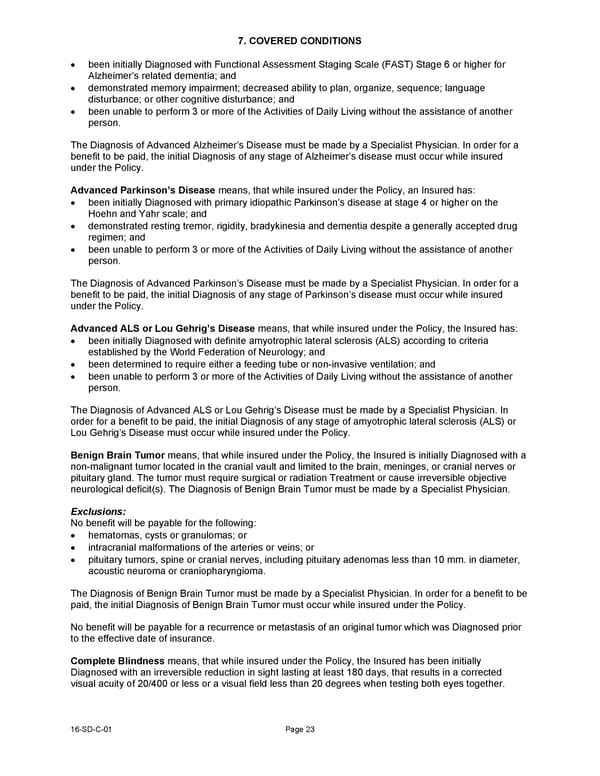7. COVERED CONDITIONS · been initially Diagnosed with Functional Assessment Staging Scale (FAST) Stage 6 or higher for Alzheimer’s related dementia; and · demonstrated memory impairment; decreased ability to plan, organize, sequence; language disturbance; or other cognitive disturbance; and · been unable to perform 3 or more of the Activities of Daily Living without the assistance of another person. The Diagnosis of Advanced Alzheimer’s Disease must be made by a Specialist Physician. In order for a benefit to be paid, the initial Diagnosis of any stage of Alzheimer’s disease must occur while insured under the Policy. Advanced Parkinson’s Disease means, that while insured under the Policy, an Insured has: · been initially Diagnosed with primary idiopathic Parkinson’s disease at stage 4 or higher on the Hoehn and Yahr scale; and · demonstrated resting tremor, rigidity, bradykinesia and dementia despite a generally accepted drug regimen; and · been unable to perform 3 or more of the Activities of Daily Living without the assistance of another person. The Diagnosis of Advanced Parkinson’s Disease must be made by a Specialist Physician. In order for a benefit to be paid, the initial Diagnosis of any stage of Parkinson’s disease must occur while insured under the Policy. Advanced ALS or Lou Gehrig’s Disease means, that while insured under the Policy, the Insured has: · been initially Diagnosed with definite amyotrophic lateral sclerosis (ALS) according to criteria established by the World Federation of Neurology; and · been determined to require either a feeding tube or non-invasive ventilation; and · been unable to perform 3 or more of the Activities of Daily Living without the assistance of another person. The Diagnosis of Advanced ALS or Lou Gehrig’s Disease must be made by a Specialist Physician. In order for a benefit to be paid, the initial Diagnosis of any stage of amyotrophic lateral sclerosis (ALS) or Lou Gehrig’s Disease must occur while insured under the Policy. Benign Brain Tumor means, that while insured under the Policy, the Insured is initially Diagnosed with a non-malignant tumor located in the cranial vault and limited to the brain, meninges, or cranial nerves or pituitary gland. The tumor must require surgical or radiation Treatment or cause irreversible objective neurological deficit(s). The Diagnosis of Benign Brain Tumor must be made by a Specialist Physician. Exclusions: No benefit will be payable for the following: · hematomas, cysts or granulomas; or · intracranial malformations of the arteries or veins; or · pituitary tumors, spine or cranial nerves, including pituitary adenomas less than 10 mm. in diameter, acoustic neuroma or craniopharyngioma. The Diagnosis of Benign Brain Tumor must be made by a Specialist Physician. In order for a benefit to be paid, the initial Diagnosis of Benign Brain Tumor must occur while insured under the Policy. No benefit will be payable for a recurrence or metastasis of an original tumor which was Diagnosed prior to the effective date of insurance. CompleteBlindness means, that while insured under the Policy, the Insured has been initially Diagnosed with an irreversible reduction in sight lasting at least 180 days, that results in a corrected visual acuity of 20/400 or less or a visual field less than 20 degrees when testing both eyes together. 16-SD-C-01 Page23
 Critical Illness cert Page 22 Page 24
Critical Illness cert Page 22 Page 24